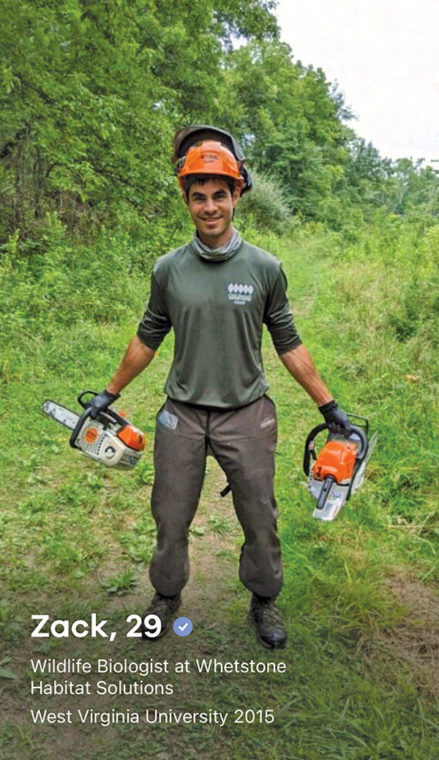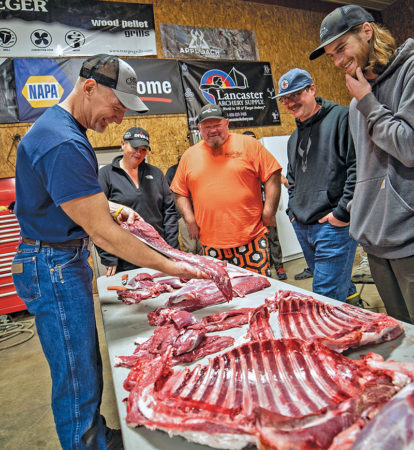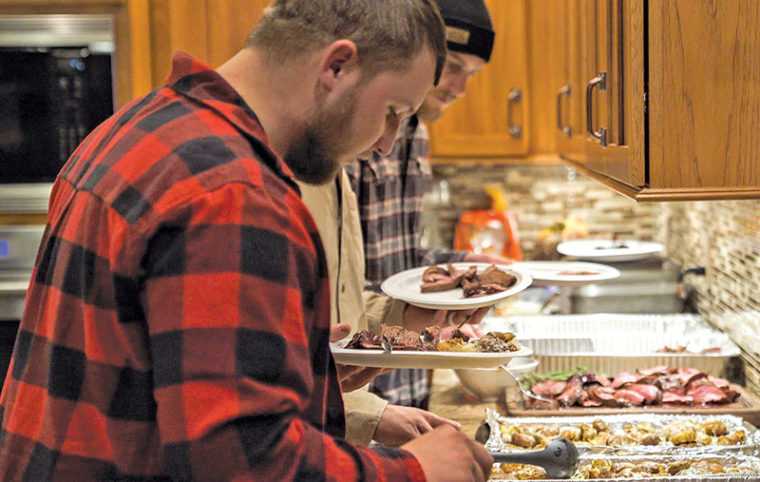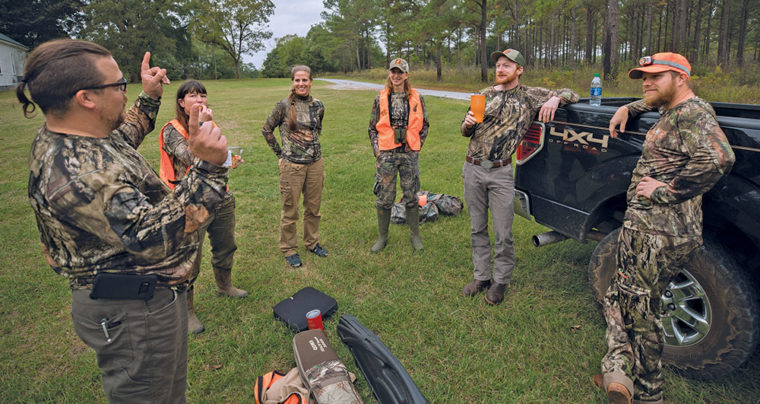How the global pandemic led to more productive conversations with non-hunters – through online dating.
If the year 2020 had one overarching theme, it was that no one is immune to change. Although some of the pandemic restrictions put in place had silver linings, such as getting people outdoors and teaching them the commitment it takes to bake a loaf of sourdough bread, they certainly paid no favors to anyone’s social life. With the new restraints placed on social interactions, I decided to take advantage of this “level playing field” and try my introverted hand in the online dating scene. With countless apps and dating services available at my disposal, I was certain the future Mrs. Vucurevich was simply a right-swipe away.
Soon after dipping my toe into the virtual dating scene, I was struck by a few immediate observations, the first being that all people – including non-hunters – are naturally inquisitive about wildlife. The second being that I could use this virtual platform, coupled with their curiosity for wildlife, as a proving ground for fine-tuning my approach in communicating with non-hunters about why I choose to participate in the act of hunting.
I’ve learned that when we come to the table with solid facts on the role hunting plays in conservation, and when we are open-minded and willing to politely field any questions or concerns voiced by the other party, we place ourselves in a much better position to be understood and accepted. I have learned, through trial and plenty of error, what does and does not resonate with members of the non-hunting community.

Zack’s dating profile mentioned that he is a “wildlife biologist,” which attracted questions and interest from many who imagined Steve Irwin or Jack Hanna.
The fact that singles of all camps seem to have an affinity toward a profile with “Wildlife Biologist” listed as their job title put me in a position to have a conversation about hunting with a wide range of people with different jobs, hobbies and backgrounds. From tree-hugging vegans to gun-toting huntresses. From bartenders to healthcare professionals. Whenever people see that I work with wildlife, their mind goes directly to Steve Irwin, Jeff Corwin or Jack Hanna.
The potential suitor is quickly disappointed to learn that I make a living as a habitat consultant and conservation worker, and I am not wrestling crocodiles or cuddling koalas all day. The conversation inevitably shifts to describing what a habitat consultant is and does, along with who my clients typically are. Much to their surprise, I explain that they are almost exclusively deer hunters willing to pay for improving the quality of wildlife habitat on their private properties. At this point, if they haven’t immediately unmatched with me after my proclamation of being an avid hunter and outdoorsman, I am usually met with nothing but genuine curiosity.
Remember – we are fortunate to be able to participate in the traditions of hunting and should be appreciative of any opportunity we have to educate others on the hows and whys of what we do. Whether it was in person, or virtually on a dating app, the conversations all seem to have a similar trend in both direction and outcome. Before we get started, let’s remember that a conversation about hunting with a curious non-hunter is an open discussion. We are not trying to win an argument.
This isn’t an article about converting the anti-hunter. It’s about educating the non-hunter on what we do and why we do it. True anti-hunters make up a very small proportion of people. Our goal should be to educate the vast majority of people who find themselves somewhere between “anti-hunter” and “active participant.”
The following is a list of some of my favorite talking points for introducing a non-hunter to the benefits of what we, as hunters, do. This is not a complete list, but it is the talking points I have found to get the most positive response from the non-hunters I’ve talked with over the past year.
1. Talk About How Much You Appreciate the Bounty of the Harvest.
One of the first topics I bring to the attention of a non-hunter is the gratitude I have for the animal I harvested each and every time I prepare and consume the meat. There seems to be a borderline spiritual experience associated with consuming a creature that you were fortunate enough to harvest. Every time I open my freezer and see a well-stocked bounty of game, I receive a tangible feeling of fulfilment. Non-hunters tend to resonate with this message – that we appreciate and look forward to consuming our harvest. Nearly every time I talk about my favorite ways to prepare venison or experiences I’ve had sharing my meals with others, I get the same relative response: “Well, at least you eat it.”
“Of course I eat it!” should be our response. It should be a foreign idea to people that we wouldn’t eat what we kill! I cannot stress this concept enough – educating non-hunters about how we utilize our bounty outside of the “trophy” they often associate with our practice. I also happen to be an avid fly fisherman, so not only do I get to fill the freezer with venison, but I also debone and salt deer tails in order to dye and tie flies with – another memento from my harvests.

Deer as food is not only an important concept when talking to non-hunters, it’s also a benefit that can attract some to become participants. Here, NDA’s Kip Adams gives a butchering demonstration to participants at a Field to Fork hunter recruitement event. Photo: The Bearded Buck
2. Discuss Wanton Waste Laws
Wanton waste simply means “to intentionally waste something negligently or inappropriately.” To put it in terms of our conversation, legal hunters are required to salvage all or the majority of edible meat from the animals they harvest. This is important because we want the other party to know that it isn’t just our conscience driving us to retain and consume what we kill – it is written into law that we are required to do so; and negligently abandoning edible portions of game behind in the field is punishable by law. In Alaska, for instance, penalties for wanton waste violations include a minimum imprisonment of 7 days in county jail and a minimum fine of $2,500. Put simply: we consume what we kill because we appreciate the animal and enjoy providing for ourselves and others, and we would be in violation of hunting and fishing regulations to not consume or donate the meat.
3. The Role Hunting Plays in Wildlife Conservation
This concept, however important, is often a difficult one to keep the other party engaged. The key talking points should revolve around Pittman-Robertson (or PR) funding and license sales. The Pittman-Robertson Act, enacted in 1937, is an excise tax on all hunting equipment sold; namely guns, ammo, and archery equipment. This 11% tax is built in to the price of the products and will not be shown on the receipt. The money collected by this tax is collected by the Department of the Interior and redistributed to the states based on an equation accounting for the number of hunting licenses sold compared to the geographic size of the state.
Why is this important for hunters and non-hunters alike? Because all PR funding received by the state must be used by the state wildlife agency for conservation projects including, but not limited to, hunting and fishing land acquisition, wildlife population surveys, migration corridors, wetland mitigation, and countless other wildlife-focused improvements. In 2019 alone, the USFWS allocated over $673 million PR dollars back to the states to fund such projects! To date, between Pittman-Robertson and its sister Sportfish Restoration Act (Dingell-Johnson), more than $21 billion has been appropriated for state conservation and recreation projects.
4. Alternatives for Deer
Another topic I have received positive feedback on is the concept of “alternative cause of death” for the animal we intend to harvest. Let’s not forget – deer are prey animals and their natural population dynamics and reproduction rates have evolved to account for a high level of predation. Most non-hunters are blissfully unaware of this fact as well as the fate most animals inevitably face. If we do our job as ethical hunters and make a well-placed shot on our quarry, the animal is presumably dead in a matter of seconds before it ever realized what happened.

“At least you eat it” is a common sentiment Zack heard when talking with people unfamliar with hunting. “Of course I eat it,” should be our response. Non-hunters are highly accepting of hunting when they learn we hunt for food. Photo: The Bearded Buck.
It is important to note that unless the animal is kept in a zoo under the watchful eye of its caretakers, it is likely not going to die of old age. For those critters fortunate enough to live out their days in the cage-free openness of the wild, their causes of death are much less desirable. Truth of the matter is, these animals that aren’t harvested by a hunter will likely either succumb to predation, starvation, injury and subsequent infection, or die a slow death associated with any number of common wildlife diseases. If I were an animal with the option of choosing my own death, I’d take a well-placed .270 round before any of the “natural” alternatives.
5. Population Control and Disease Risk
Lastly, I want to touch on the topic of population control as a justification for hunting. I waited to discuss this last, because it is my least favorite to discuss with a non-hunter. Not because the reasoning is any less important than any of the others, but more so that I’ve always felt this was a cheap cop-out for why we participate in hunting. Saying you hunt “to keep the populations in check” is like saying you go to church because you like the taste of crackers dipped in cooking wine. It deprives your argument of all of the sentimental and spiritual fulfilment you retain from participating in such a rich tradition as hunting. Nobody wakes up at 4 a.m., showers in scent-free soap, walks through the woods in the dark, climbs into a tree, and patiently waits for a deer to walk within range out of a sense of duty to “keep the population in check.” No, we participate in hunting because of all of the aforementioned reasons and because we enjoy everything associated with hunting. We do it because hunting is a natural part of who we are as humans and has been so for thousands of years. We are hunters just like deer are prey animals. We also hunt because we love the entire experience, and there is no shame in that.
So yes, hunting is a management tool – and a very important one. With issues such as chronic wasting disease becoming more prevalent, it is up to us hunters to do our part in protecting the resource from catastrophic collapse. Just be aware that the blanket reasoning of “population control” lacks the legitimacy and honesty most non-hunters are looking for in your justification for participating in a blood sport.
Remember, being a hunter is a privilege, and with that privilege comes responsibility. It is important to keep in mind that we, as hunters, are in the minority. Being outnumbered by members of the non-hunting community means that each and every one of us is an important representative of the greater whole. It is up to us to be good ambassadors of the sport and to know our facts before running blindly into this kind of touchy conversation. Treat others with respect and be receptive to their opinions and concerns about what we do. As ethical hunters, we have nothing to hide, so be open to questions and share honestly. We are not trying to “win them over,” we are trying to shed light on what hunting means to us and why we do it. I hope you found this article better prepares you for your next opportunity to be a hunting advocate!
By the way, yes – I’m still searching for future Mrs. Vucurevich.
